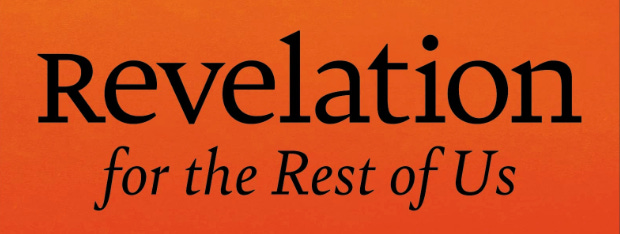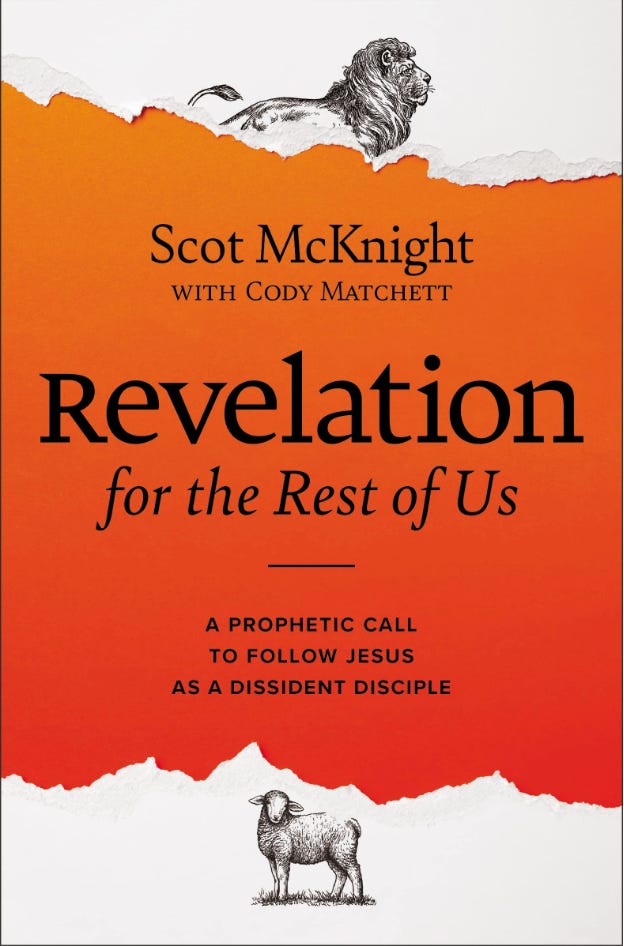Revelation’s Disciple is a Witness
In the amazing Book of Revelation, which is a discipleship manual for those living in empire, a central word describing a follower of Jesus is the word witness. As a noun (“witness, testimony”) you can find it at 1:2, 9; 6:9; 11:7; 12:11, 17; 19:10, and 20:4. As a verb (“to witness, testify, to embody the way of the Lamb”), you can find it at 1:2; 22:16, 18, 20. The notion of a witness can be connected as well to a martyr. The word “witness” translates the Greek term martus, from which we get martyr. The references would include 1:5; 2:13; 3:14; 11:3, and 17:6.
Here then is an example each:
1:1-2: The revelation from Jesus Christ, which God gave him to show his servants what must soon take place. He made it known by sending his angel to his servant John, 2 who testifies to everything he saw—that is, the word of God and the testimony of Jesus Christ.
1:4-5: Grace and peace to you from him who is, and who was, and who is to come, and from the seven spirits before his throne, 5 and from Jesus Christ, who is the faithful witness, the firstborn from the dead, and the ruler of the kings of the earth.
With that sketch, we ask and Cody and I discuss some of this in Revelation for the Rest of Us, How does a follower of Jesus embody the way of the Lamb in a way that the person becomes a witness? What is a witness in an age of dragons and wild things?
[By the way, one more week before RRU starts shipping!]
First, Jesus is the paradigmatic witness. He is the true and allegiant witness (1:5; 3:14). To follow Jesus is to follow the true witness, and how the true witnessed is how the followers of Jesus are to witness.
Second, Jesus followers are witnesses, leading both to verbal witness and to martyrdom (2:13; 6:9; 12:11; 17:6).
Third, a witness is a line of transmission: God gives the apocalypse (1:1) to an angel who gives it to John who passed it on (1:1-2). Thus, the Book of Revelation is a word of witness, a Jesus-Christ-witness.
Fourth, witness is a “see and say” term. One cannot reduce it to embodied martyrdom. A witness is someone who witnesses a person or event or hears something said and then verbally testifies to what they saw or heard. Brian Blount, whose commentary on Revelation is the best I have read, says the term witness is “language preoccupied with not dying, but declaration.” Craig Koester, whose commentary is a massive explanation of all things Revelation, says the term is about “a statement of truth.” Like the sign on London’s Tube, witness is a “see it, say it, sort it” term.
Fifth, a witness is then more prophetic than martyrological. It is about someone with the courage to make a public witness inside the hothouse of the empire’s opposition to the gospel about Jesus as the true king.
Sixth, a witness is a citizen of a different city, and different realm, a different empire. New Jerusalem, of course, but inasmuch as New Jerusalem counters this world’s various versions and instances of Babylon.
Seventh, a witness is then someone who knows/experiences/sees Jesus/gospel and puts one’s life on the line, boldly witnessing to Jesus as Lord, both by speaking and backing up one’s speech with allegiance to what one says.
Now notice this. A witness is not a passive withdrawal. Brian Blount gets it right when he writes in his book Can I Get a Witness?,
“Revelation craves witness as engaged, resistant, transformative activism that is willing to sacrifice everything in an effort to make the world over into a reality that responds to and operates from Jesus’ role as ruler and savior of all.”
A witness then is an active resister, a dissident, of the wild things and dragons, of the agents of Babylon and empire. A witness stands up and stands out to speak truth to the powers.
Remember, religion was not spirituality in the world of Revelation. Religion, empire, and imperial cult were tied into a knot. The gods and the emperor, as Drew Strait describes so well in his wonderful book The Angry Tyrant, present themselves as a unity in the Roman empire. To confess Jesus as Lord was to oppose the system, not just some local spirituality. And, this means Christianity is as political as it is spiritual.
We find various forms of resistance in the Book of Revelation that bring suffering: Nicolaitans (2:6; idol worshipers and foods offered to idols), synagogues (2:9; 3:9), Pergamum’s worship (2:13, 14, 15), Jezebel’s prophets (2:20), in Sardis the issue is suffering (3:2), and in Laodicea it is the power of money (3:17).
Richard Bauckham, a specialist in Revelation, in his book The Climax of Prophecy, said, “The Book of Revelation is one of the fiercest attacks on Rome and one of the most effective pieces of political resistance literature from the period of the early empire.”
Those who follow this Book’s shape will become dissidents of Babylon. They also become skilled at discerning the presence of Babylon in the church.




This is such an important dimension of Revelation. Blount is one of few to translate hypomonē as resistance. But I'm convinced that's right. It's the hypomonē of the mother and 7 brothers in 4 Maccabees that results in Judah's redemption. And it's the combination of witness and resistance that brings victory in Revelation (1:9; I think 12:11 is key.)
Thank you for bringing this out. I can't wait to get to sharing this book around, even at the cost of sales for myself. :)
I am thinking of Luke 12:49-53 especially when read the article and the subtitle of the book. Jesus shook things up. Made us reconsider what truly following Jesus means.